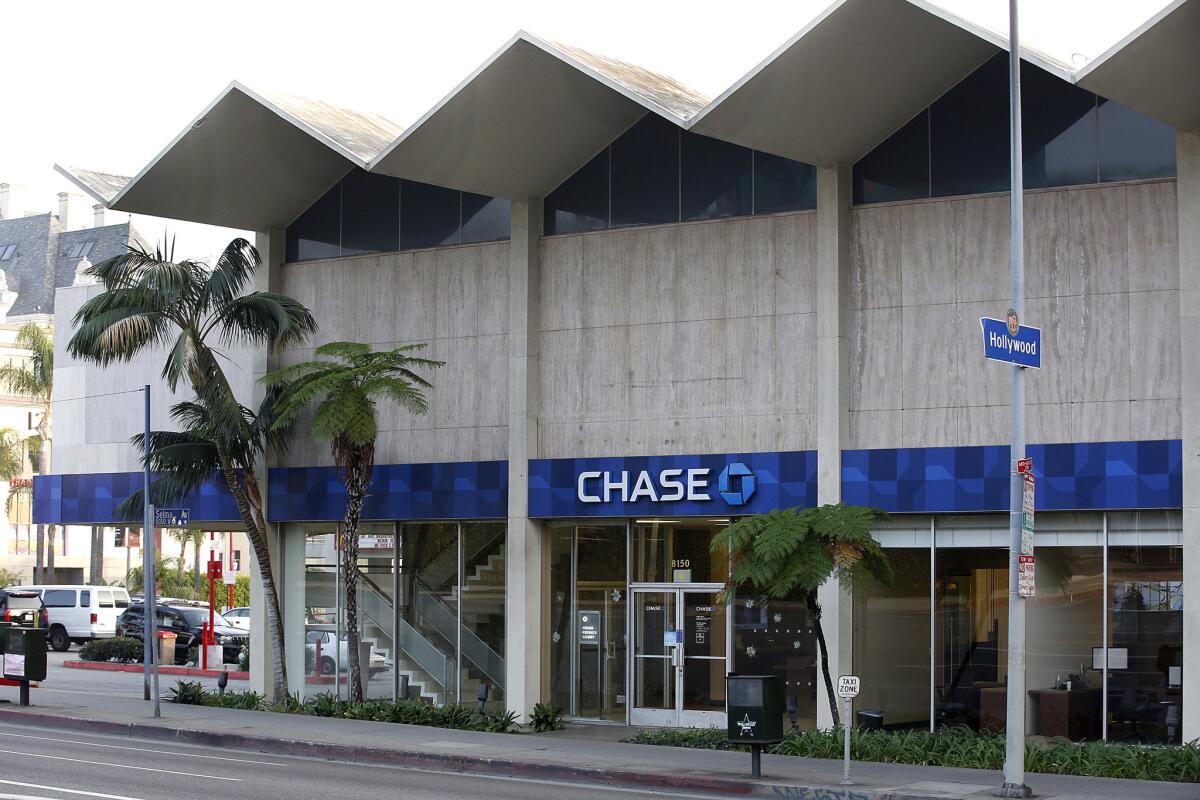Court OKs demolition of Hollywood building for Frank Gehry project, dealing a blow to preservationists
A three-judge panel has handed a defeat to historic preservationists in Los Angeles, upholding the city’s plan for demolishing a 1960 bank building on the site of a planned Frank Gehry-designed mixed-use complex.
In a ruling issued last week, California’s 2nd District Court of Appeal overturned a Los Angeles County Superior Court ruling blocking the city from razing the Lytton Savings building in Hollywood, which is considered a strong example of the angular Googie design style.
However, the appellate court also found that the city mishandled another aspect of the project — closure of a right-turn lane from Sunset Boulevard onto southbound Crescent Heights Boulevard. The court sent the project, known as 8150 Sunset, back to the city so that a hearing can be conducted on that lane closure.
A representative of City Atty. Mike Feuer called the ruling a “significant victory” for the city, which had argued that its environmental review was prepared correctly. The court confirmed the City Council’s decision to “approve a project that meets the city’s objectives,” Feuer spokesman Rob Wilcox said.
One of the project’s opponents also declared victory, however, saying the ruling will force the council to rescind its November 2016 decision to approve the project — and then carry out a formal review of the planned lane closure.
“Having all your approvals revoked is hardly a win” for the city, said Laura Lake, board member of the nonprofit advocacy group Fix the City, one of the groups that sued over the project.
Under the state Streets and Highways Code, the city must present evidence showing that a street is unnecessary for public use before “vacating” it. Lake contends that the city cannot make that finding because that section of Sunset is heavily used.
Wilcox said the city is evaluating its next steps. Preparation of a “street vacation” report for the council takes six to nine months on average, according to information posted on the Bureau of Engineering website. That process can last an additional six months if an environmental determination is required, the site states.
Any street vacation hearing would be conducted by the council, Wilcox said.
Councilman David Ryu, whose district includes the 8150 Sunset site, had no comment on the ruling, saying through a spokesman that his office is still reviewing it. Historic preservationists, for their part, were discouraged by the decision.
The Los Angeles Conservancy, which sued over the 229-unit project, had argued that 8150 Sunset could be designed in a way that preserves the bank building, known for its zigzag roof and other features. The court, on the other hand, concluded that design alternatives aimed at retaining the structure would have rendered the Gehry-designed project “infeasible.”

“We’re very disappointed with the ruling,” said Linda Dishman, president and chief executive of the Los Angeles Conservancy. “We were heartened by the decision at the Superior Court level and felt that it was a good case.”
Dishman said her organization is looking at its legal options. A representative of Townscape Partners, the project’s developer, declined to comment.
The 8150 Sunset project calls for five structures, one of them reaching 15 stories, as well as 65,000 square feet of commercial space. The project, approved by the council in November 2016, would be designed by Gehry, known for his work on Walt Disney Concert Hall and other landmarks.
Gov. Jerry Brown made 8150 Sunset one of the state’s projects entitled to an accelerated legal review if challenged in court. Foes of the project lodged multiple legal arguments against the development.
Fix the City had argued that the project sits too close to an earthquake fault and does not comply with the city’s planning, zoning and housing ordinances. The court rejected those arguments, agreeing with the group only on the question of the right-turn lane, which would be converted into a portion of an outdoor plaza.
The city’s lawyers argued that a street vacation hearing was unnecessary because the land would be converted from vehicular space to pedestrian use. The court, in an 80-page ruling, said the street segment would be merged into a “public-private project, which will be essentially a private development.”
“We hold that the complete removal of a street in favor of a plaza that is linked economically and spatially to a private development constitutes a ‘vacation’ of that street,” the ruling states.
The court also took note of concerns expressed by officials in Los Angeles and nearby West Hollywood over the loss of the lane.
“Eliminating the right-turn lane promises to generate significant community reaction,” the ruling states. “In fact it already has.”
Twitter: @DavidZahniser
More to Read
Sign up for Essential California
The most important California stories and recommendations in your inbox every morning.
You may occasionally receive promotional content from the Los Angeles Times.











